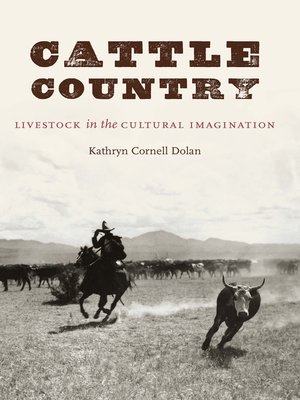
Sign up to save your library
With an OverDrive account, you can save your favorite libraries for at-a-glance information about availability. Find out more about OverDrive accounts.
Find this title in Libby, the library reading app by OverDrive.



Search for a digital library with this title
Title found at these libraries:
| Library Name | Distance |
|---|---|
| Loading... |
As beef and cattle production progressed in nineteenth-century America, the cow emerged as the nation's representative food animal and earned a culturally prominent role in the literature of the day. In Cattle Country Kathryn Cornell Dolan examines the role cattle played in narratives throughout the century to show how the struggles within U.S. food culture mapped onto society's broader struggles with colonization, environmentalism, U.S. identity, ethnicity, and industrialization.
Dolan examines diverse texts from Native American, African American, Mexican American, and white authors that showcase the zeitgeist of anxiety surrounding U.S. identity as cattle gradually became an industrialized food source, altering the country's culture while exacting a high cost to humans, animals, and the land. From Henry David Thoreau's descriptions of indigenous cuisines as a challenge to the rising monoculture, to Washington Irving's travel narratives that foreshadow cattle replacing American bison in the West, to María Amparo Ruiz de Burton's use of cattle to connect race and imperialism in her work, authors' preoccupations with cattle underscored their concern for resource depletion, habitat destruction, and the wasteful overproduction of a single breed of livestock.
Cattle Country offers a window into the ways authors worked to negotiate the consequences of the development of this food culture and, by excavating the history of U.S. settler colonialism through the figure of cattle, sheds new ecocritical light on nineteenth-century literature.
Dolan examines diverse texts from Native American, African American, Mexican American, and white authors that showcase the zeitgeist of anxiety surrounding U.S. identity as cattle gradually became an industrialized food source, altering the country's culture while exacting a high cost to humans, animals, and the land. From Henry David Thoreau's descriptions of indigenous cuisines as a challenge to the rising monoculture, to Washington Irving's travel narratives that foreshadow cattle replacing American bison in the West, to María Amparo Ruiz de Burton's use of cattle to connect race and imperialism in her work, authors' preoccupations with cattle underscored their concern for resource depletion, habitat destruction, and the wasteful overproduction of a single breed of livestock.
Cattle Country offers a window into the ways authors worked to negotiate the consequences of the development of this food culture and, by excavating the history of U.S. settler colonialism through the figure of cattle, sheds new ecocritical light on nineteenth-century literature.







